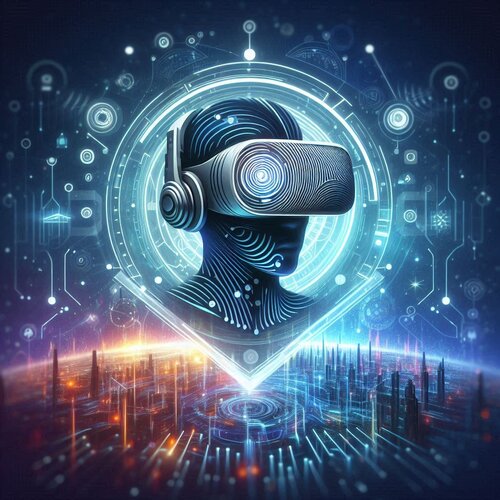 Caption
Caption
In the rapidly evolving landscape of artificial intelligence (AI), global cultural activities are undergoing a profound transformation. This technological revolution is reshaping how we create, consume, preserve, and share our cultural heritage. From art galleries to ancient ruins, AI's influence is both exhilarating and thought-provoking. Let's delve into the multifaceted impact of AI on worldwide cultural activities, exploring its potential to redefine creativity, enhance accessibility, and foster cultural exchange.
Revolutionizing Artistic Creation
The creative world is witnessing a paradigm shift as AI emerges not just as a tool, but as a collaborative partner in the artistic process. Across various disciplines, artists are harnessing AI to stretch the boundaries of their craft:
1. Visual Arts : The advent of AI-powered tools like DALL-E and Midjourney has ushered in a new era of visual experimentation. These technologies empower artists to transform textual descriptions into vivid imagery, unlocking previously unimaginable concepts and styles. Rather than supplanting human creativity, AI is amplifying it, opening doors to unexplored artistic territories.
2. Music Composition : AI algorithms are now capable of composing original music across a spectrum of genres, from classical symphonies to chart-topping pop hits. While this development raises intriguing questions about the nature of creativity, it also equips musicians with novel tools for inspiration and collaboration.
3. Literature: In the realm of writing, AI language models are emerging as valuable assistants. From sparking plot ideas to alleviating writer's block, these AI tools are becoming indispensable brainstorming partners for many authors, despite lingering concerns about fully AI-authored books.
Preserving and Revitalizing Cultural Heritage
AI's role in safeguarding our cultural legacy is becoming increasingly crucial:
1. Digital Restoration : Cutting-edge AI algorithms are breathing new life into damaged artworks, ancient manuscripts, and historical artifacts. With unprecedented accuracy, this technology is salvaging cultural treasures that might otherwise be lost to the ravages of time.
2. Language Preservation: For languages on the brink of extinction, AI-powered translation and learning tools offer a beacon of hope. These technologies are instrumental in documenting and teaching endangered languages, ensuring the continuity of diverse linguistic heritages.
3. Virtual Museums: AI is revolutionizing the museum experience by creating immersive, virtual exhibitions. This democratization of access allows people worldwide to explore and appreciate diverse cultural artifacts, transcending geographical boundaries.
Personalizing Cultural Experiences
AI's prowess in analyzing vast datasets is transforming how we engage with culture on a personal level:
1. Recommender Systems : From streaming platforms to online art galleries, AI-driven recommendation engines are curating tailor-made cultural experiences. This technology has the potential to broaden horizons by introducing individuals to diverse cultural content they might otherwise overlook.
2. Interactive Exhibitions*: AI is powering a new generation of adaptive museum exhibits that cater to visitors' unique interests and learning styles, making cultural education more engaging and impactful.
3. Personalized Tourism: AI-powered applications are revolutionizing travel by creating customized itineraries that spotlight cultural sites and activities aligned with individual preferences, fostering deeper cultural immersion for tourists.
Challenges and Ethical Considerations
While AI presents exciting possibilities for cultural activities, it also brings forth significant challenges:
1. Authenticity and Originality : The increasing involvement of AI in creative processes raises important questions about the authenticity and originality of AI-assisted or AI-generated works, challenging conventional notions of authorship and creativity.
2. Cultural Bias: There's a risk that AI systems may perpetuate or amplify cultural biases present in their training data, potentially marginalizing certain cultural perspectives and reinforcing dominant narratives.
3. Digital Divide : The advantages of AI in cultural activities may not be equally accessible to all, potentially exacerbating existing inequalities in cultural participation and representation.
4. Copyright and Intellectual Property: The integration of AI in creative processes gives rise to complex legal questions surrounding copyright and intellectual property rights, particularly for AI-generated works.
Fostering Cross-Cultural Understanding
One of the most promising aspects of AI in the cultural domain is its potential to promote global understanding:
1. Real-time Translation: AI-powered translation tools are dismantling language barriers, facilitating more direct cultural exchange and dialogue across linguistic divides.
2. Cultural Analytics : AI's capacity to analyze cultural trends and patterns across extensive datasets provides valuable insights into cultural similarities and differences, fostering mutual understanding.
3. Virtual Cultural Exchange: AI-driven virtual and augmented reality technologies are creating immersive cross-cultural experiences, allowing people to virtually "visit" and interact with cultures from around the globe.
The Future of AI and Cultural Activities
As AI continues to advance, its impact on cultural activities will undoubtedly intensify. The key to navigating this new frontier lies in harnessing AI's potential while preserving the human essence of culture. This endeavor involves:
1. Developing AI systems that enhance rather than replace human creativity.
2. Ensuring diverse cultural representation in AI development and application.
3. Establishing ethical frameworks for the use of AI in cultural contexts.
4. Promoting digital literacy to ensure widespread participation in AI-enhanced cultural activities.
In closing, the convergence of AI and culture represents a new frontier of human ingenuity and technological innovation. As we navigate this evolving landscape, we have the opportunity to leverage AI not merely as a tool, but as a means to celebrate, preserve, and evolve our rich tapestry of global cultures. The future of cultural activities in an AI-enhanced world is not set in stone; it's a blank canvas awaiting the vibrant colors of human creativity and machine intelligence.

You must be logged in to post a comment.